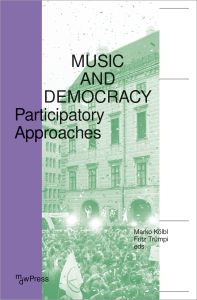Marko Kölbl, Fritz Trümpi, eds. Music and Democracy: Participatory Approaches, 2021, Vienna: mdwPress.
This rich collection of essays, many of them incubated in the forum of the annual isaScience conference of the mdw, is essential (and open-access) reading—not only for its institutional, disciplinary, geographic, and critical diversity of voices and approaches and its breadth of subjects, but also for its historical sweep that suggests deeper contextual understandings in light of the precarious conditions of our historical moment.
Editors Marko Kölbl and Fritz Trümpi identify two common concerns of these contributions. The first that they name is the “tensional dichotomy” of hegemonic and/or regressive political and institutional interests vs. music and performance practices, which scholars often celebrate in connection with narratives of inclusive, liberal democratic, and progressive social progress. The conjoined second concern is a prudent critical approach to the similarly celebrated “promise and myth of democratisation” through media technologies, which in practice embody more complex and conflicted realities.

The nine balanced essays representing an at least equal number of national academies and disciplines (cultural history, cultural sociology, global history, media studies, women’s studies, cultural policy, and historical musicology and ethnomusicology) are grouped under four interconnected concerns. The first, “From Recorded Democracy to Digital Participation,” is elaborated by Maria Siefert’s work on the “bootlegging” of art and folk musics in the US and USSR during the 1960s and ’70s, while Raphaël Nowak and Ben Morgan critique the “leitmotif” of the democratising power of digital and streaming technologies. In the second section, David Ferreiro Carballo and Gabrielle Prud’homme investigate historical (mis)uses of “bourgeois music culture” with a look at the short-lived Spanish National Music Society (1915–1922) and Italian fascist use of Verdi, respectively. The third section surveys a range of “non-democratic” performance practices: Dean Vuletic’s history of the pan-European hopes of the Cold War-era Intervision Song Contest, Ondřej Daniel’s class reading of Eastern European hardbass, and Rumya Putcha’s deep critical feminist breakdown of the misogynist and casteist misuse of the image of the South Indian temple dancer in a range of globalised Hindu nationalist discourses. The final section on “Sonic Implications of Political Changes” contains a contribution by Milena Dragićević Šešić & Julija Matejić on a range of media, radio, noise, and choral “counterpublics” in Serbia since the 1990s. This analysis is paired with Katelyn Best’s focused ethnographic work on Deaf musicians and performers using hip hop to further challenge the Smallian notion of “musicking” that underlies all of the contributions.
In sum, this volume’s musickings invite the reader to imagine further critical ontologies of music and performance within popular movements. It also suggests distinguishing consumption, production, distribution, spectatorship, fandom, and the undemocratic in music from viable and inclusive democratic participations that might take us beyond “tensional dichotomies” to less convenient and more unsettling but also more actionable understandings. Such a paradigm shift in music and performance studies with respect to music’s possibilities and limits would be vital to the reinvigoration of diverse and inclusive democratic movements for our time.

